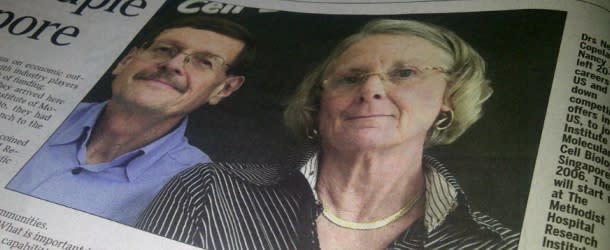Renown biomed couple leaving S’pore for the US

Five years ago, they joined the Institute of Molecular and Cell Biology (IMCB) in Singapore as some of the first brand-name hires.
Now, star cancer geneticists Neal Copeland, 64, and Nancy Jenkins, 61, who left their 20-year career at the US National Cancer Institute for Singapore, are calling it quits, reported The Straits Times (ST).
They will be moving to Houston, Texas, where from October they will be co-directors of a basic cancer research programme at The Methodist Hospital Research Institute and the Methodist Cancer Centre.
While a generously funded state programme there has been attractive for heavyweights in cancer research, it is also understood that the husband-and-wife team are frustrated with the research scene here.
Nature, an international weekly journal of science, highlighted the duo's decision to leave Singapore in an article published in December 2010.
The article, titled Singapore's salad days are over, reported that the nation's total research budget was "abruptly shifted to competitive industrial alignment funds' last September. This means access to funding depends on researchers' abilities to show that their work has industrial applications.
The policy was particularly aimed at the biomedical sciences, the article claimed. Amid frustrations over issues such as how the government will review research applications, Dr Copeland and Dr Jenkins decided to leave the country, it said.
The couple, currently principal investigators at the institute's cancer genetics laboratory, did not respond to ST's request for an interview.
The constraints biomedical scientists here face include having to spend time on red tape instead of research and increased pressure to focus on economic outcomes to get funding, reported the paper.
When the pair, among the most-cited biomedical scientists worldwide, first arrived in Singapore in 2006, they wanted to take research from the bench to the bedside and commercialise basic research.
According to the Agency for Science, Technology and Research's (A*Star), which oversees the IMCB, the cancer experts made a big splash in research and training here.
A*Star's Biomedical Research Council's executive director Lee Eng Hin said they sharpened the IMCB's focus in areas such as cancer, cell biology and developmental biology.
This deepened the Institute's understanding of human diseases and encouraged the translation of basic scientific discoveries into clinically useful products and commercially viable applications.
They also helped nurture a new generation of talent, he added.
Thanking the duo for their work, he told the paper, "While we are sad to see Neal and Nancy go, we are also heartened that they remain in the international biomedical research arena."
"We expect that they will continue to make great contributions to science and to society, and wish them the very best in their endeavours," said professor Lee.
He noted that Singapore is fortunate to have attracted and anchored many international scientists.
"Even when some of these scientists move on, we believe they will continue to have Singapore on their minds, and they are critical in building bridges between Singapore and the international scientific communities," he said.
"What is important is that they have lent their scientific capabilities, international standing, extensive network as well as experience in mentoring the next generation of scientific leaders."
Some observers, however, told the paper that the couple's move could be a start of a migration of top talents, where more of A*Star's top scientists follow suit.
Former S*Star head Philip Yeo had also previously warned of an exodus of talent if scientists are tasked to produce economic outcomes prematurely.

